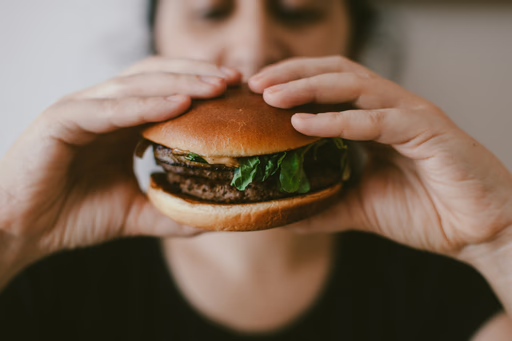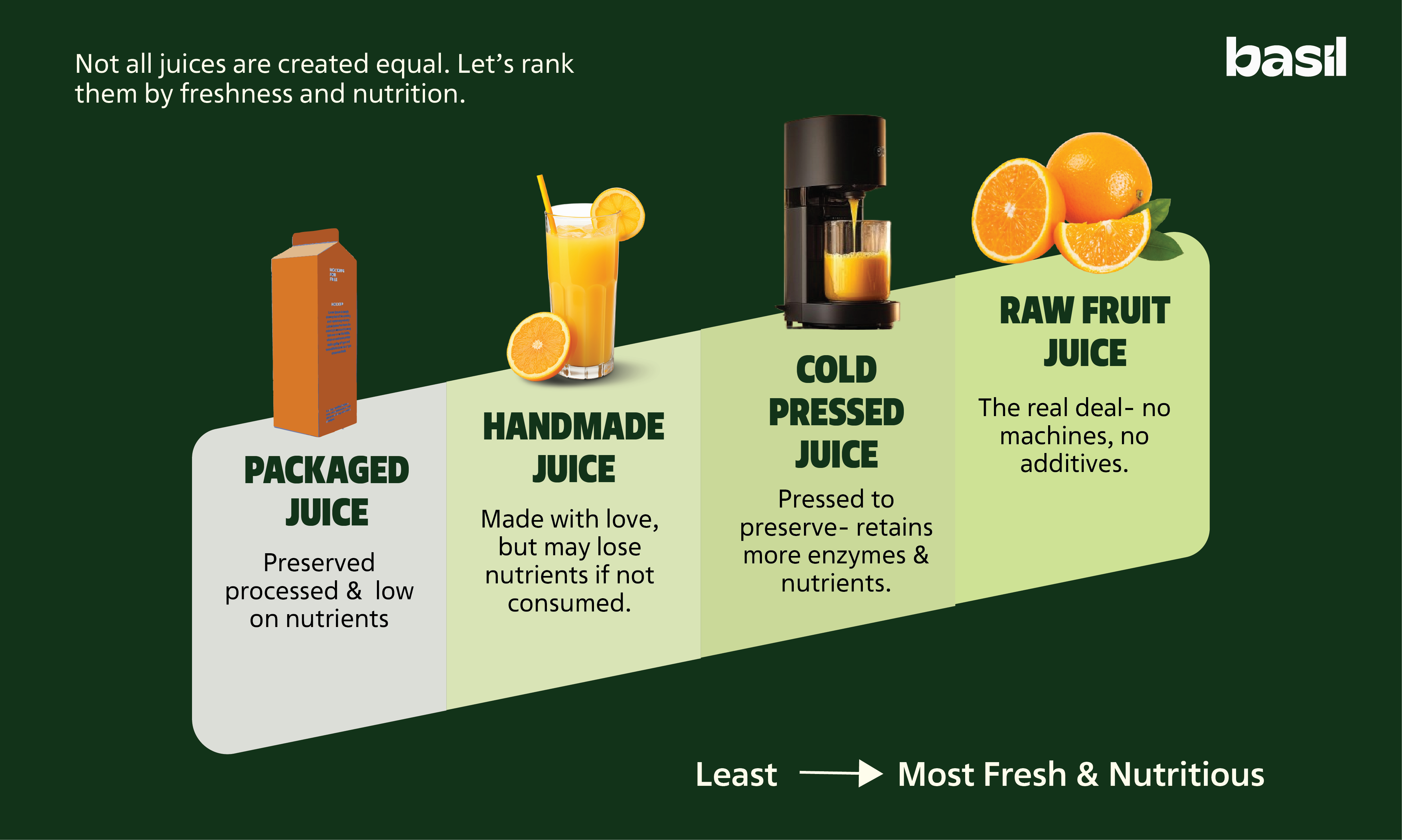
Are Juices Actually Healthy? Let’s Bust Some Myths, One Glass at a Time!
We’ve all done it, grabbed a juice thinking it’s the healthy option. It’s fruit, right? How could it not be healthy? But, let’s be real. Not all juices are created equal. Some are packed with added sugar, while others are just fruit-flavored water with no real nutritional value. So, let’s break down the data and uncover whether juices really deserve their health halo or if they`re just sugar in disguise.

Here’s the first thing to know: packaged juices often contain far more sugar than you might think. And while they may boast a "100% juice" label, they’re still far from perfect.
Many packaged juices are made from fruit concentrates, and although they may be 100% juice, they often lack the fiber and other nutrients found in whole fruits. They may also contain preservatives to extend shelf life.
According to the USDA, a 250ml serving of fruit juice can have up to 25 - 30g of sugar, which is nearly as much as a can of soda (33g per 355ml Coke).
Convenient, widely available, and has a long shelf life
High in sugar, low in fiber, and often contains preservatives that can disrupt gut health.
If you're keeping track of your health, this is closer to soda than a health drink. It’s a treat, not a daily choice especially for anyone managing blood sugar, weight, or overall health.
Making juice at home seems like the obvious "healthier" choice, right? It’s fresh, and you control what goes in. But does it really make a difference?
Fresh fruit or veggies juiced right at home have no preservatives, no additives. But, it’s still just fruit juice without the fiber.
While homemade juice doesn’t contain added sugars, the natural sugar content can still be high. According to Healthline, a large orange contains about 12g of sugar, and when juiced, you miss out on the fiber that would slow the absorption of sugar.
You control the ingredients, and there's no added sugar or preservatives
Easy to overdo it on the fruit, which can lead to a high sugar load. Also, juice lacks the satiety of whole fruit, so you’ll likely be hungry soon after.
Fresh homemade juice is fine for an occasional treat, especially if you balance it with fiber or healthy fats from a meal. But if you’re aiming for a long-term health habit, whole fruits win over juice.
Cold-pressed juice is marketed as the healthiest of the bunch. But is it truly the best option?
Cold-pressed juices are made by pressing fruits and vegetables with hydraulic pressure, preserving more nutrients than traditional heat-based methods. However, they’re still just juice without the fiber that makes whole fruits so beneficial.
Cold-pressed juices vary in sugar content depending on the fruits and vegetables used. For instance, an 8 oz (240 ml) serving of cold-pressed orange juice contains about 21g of sugar, while a vegetable-heavy green juice can contain as little as 5 to 7g.
More antioxidants, enzymes, and vitamins than traditional juices, thanks to minimal processing.
Still low in fiber and can be expensive. Portion sizes can also be misleading, with larger bottles potentially containing more sugar than you realize.
Cold-pressed juices are a better option compared to traditional juice, especially if you choose a vegetable-heavy blend. However, they should still be consumed in moderation, and not as your go-to beverage
Here’s the catch with all juices: they strip away the fiber. And fiber is the real hero. It helps slow down sugar absorption, regulates digestion, and keeps you full. Without it, juice is just liquid sugar.
According to a study published by the Harvard T.H. Chan School of Public Health, fruit juice, even 100% juice, has been linked to an increased risk of type 2 diabetes when consumed frequently. On the other hand, whole fruits are linked to a reduced risk of diabetes, likely due to the fiber they contain, which slows the absorption of sugar. So, although juice seems like a good alternative, the lack of fiber is a major downside.
Let’s set the record straight with some juice-related myths—armed with data, of course!
• Myth: Juice detoxes help you lose weight.
Reality: According to the National Institutes of Health (NIH), juice cleanses often lead to water weight loss rather than fat loss. Plus, they tend to cause sugar spikes and crashes, leaving you hungry and fatigued.
• Myth: Orange juice is a great immunity booster.
Reality: An orange contains around 9g of sugar and 62 calories. When you juice it, you get 21g of sugar and 112 calories in a single glass. You’re better off eating the whole orange for more fiber and fewer sugar spikes.
• Myth: Cold-pressed = 100% healthy.
Reality: Cold-pressed juice is still packed with sugar. In fact, according to the American Journal of Clinical Nutrition, fruit juice can raise blood glucose levels just as much as a sugary soda. Opt for a veggie-heavy cold-pressed juice, and check the sugar content.
• Myth: Juices are a good way to stay hydrated.
Reality: Water is the best way to stay hydrated. While juice might seem hydrating, it can actually leave you thirstier due to its high sugar content. Coconut water and herbal teas are better alternatives for hydration.
Now that we’ve uncovered the facts, here’s what you can do to make healthier choices without giving up on delicious beverages.
• Eat Your Fruits (Whole Ones!): Whole fruits are packed with fiber, which slows sugar absorption, keeps you full, and helps with digestion. The Harvard T.H. Chan School of Public Health states that fiber is crucial in reducing the risk of chronic diseases like diabetes and heart disease
• Try Smoothies Instead: If you love a drinkable option, smoothies are your best bet. With added veggies, protein (like yogurt or nut butter), and even some healthy fats (think avocado or flaxseeds), smoothies are far more balanced and filling than juice. According to the Journal of Nutrition, smoothies made with whole fruits and vegetables (and some added protein) help stabilize blood sugar and keep you satisfied longer.
• Hydrate Smartly: Water is the ultimate hydrator. Add some lemon, cucumber, or mint to your water for a refreshing twist. Coconut water and unsweetened herbal teas are also great hydration options that won’t spike your sugar.
Here’s the juice truth: most juices aren’t the magical health potion they’re cracked up to be. They're often packed with sugar, stripped of fiber, and lacking the nutrition your body needs for long-term health. While cold-pressed juices are the healthiest option, they’re still best enjoyed in moderation.
For daily health boosts, stick to whole fruits, water, and smoothies that combine fruits, veggies, and protein. Your body and your waistline will thank you.
Pro Tip: If you still crave juice, go for veggie-heavy, cold-pressed blends without added sugars. And if you’re looking for nutrient-packed juices that won’t break the sugar bank, check out Basil Health! Our cold-pressed juices are packed with real fruits and veggies, no added sugars or preservatives, just the good stuff.
Stay juicy but smart!
Get access to exclusive offers, discounts and tips on healthy snacking!
© Healthilicious Basil Pvt Ltd, 2025. All Rights Reserved.